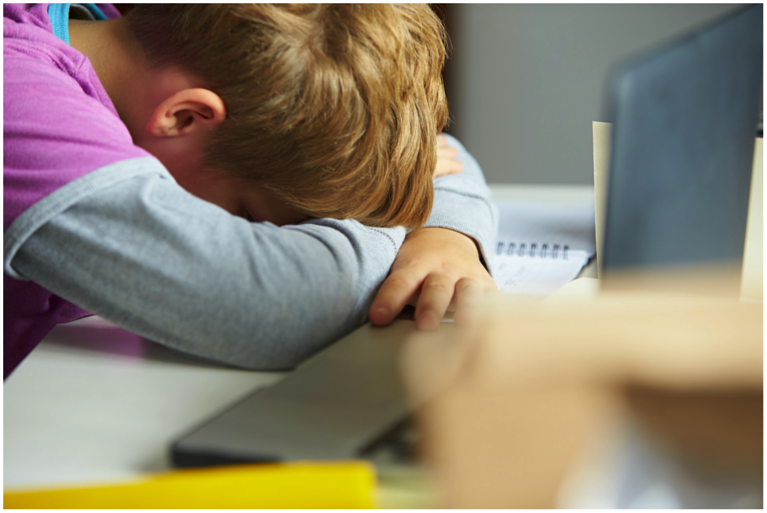Parents often struggle with helping teens fall asleep easier. Suddenly your teens bedtime becomes too late and no matter how many times you tell them to go to bed, your teen is often up well after you’ve gone to bed yourself. Once every few years, the topic of moving high school start times later pops up. While it’s usually in the context of saving money by sharing busses with elementary schools, the idea has some merit in terms of teen sleep solutions to help adolescents get the sleep they need.
The sleep doctors at Nationwide Children’s Hospital in Ohio argue that the average teenager is getting between 7 and 7 ¼ hours of sleep a night when they actually require 9 ¼ hours. That’s 2 hours less sleep every night than is required by their bodies and minds to function at their best. Some high schools start as early as 7:15 am, which means students are getting up as early as 5:45 am to get ready and access transportation to get to school. This schedule leaves adolescents tired, moody, and underachieving in academic classes (especially the first couple of periods in the morning). Given what we now know about adolescent sleep habits, moving school start times to 8:30 or even 9:00 would go a long way in reducing the sleep debt of adolescents.
Sign Up For Our Newsletter
Factors influencing adolescent sleep
A number of factors are behind the reasons why adolescents, as a group don’t get enough sleep, and while some like late night video gaming or chat sessions with friends are avoidable, others are not.
One of the biggest changes in adolescent sleep patterns is biological. It’s called sleep phase delay and it means that a child who used to fall asleep at 9:00 pm doesn’t start to feel tired until 10:30 or 11 pm. One study showed that adolescents show higher levels of alertness at 8 pm than most adults, and even more so at 10 pm. It can be biologically impossible for parents to help teens fall asleep easier. Further investigation revealed that the adolescent body’s release of the sleep-inducing hormone melatonin is delayed during the sleep phase delay portion of adolescence, making it harder for adolescents to fall asleep on their own. So the argument could be made that they’re not unable to sleep because they’re chatting to friends, but that they’re chatting to friends because they’re unable to sleep. The research did find, however that with careful limits to light exposure in the evening, the effects of the sleep phase delay could be reduced in adolescents. Unfortunately, many of the other factors that influence teenage sleep prevent the limitation of evening light exposure.
Are you ready for your child to sleep better? Find out more about our tween and teen signature framework sleep program.
Biology aside, there are a number of other factors that push adolescent bedtimes later than they ideally should be including:
Part-time Jobs – With the costs of post-secondary education being so high, many adolescents are taking on part time jobs that start soon after school and go until 9 or 10 pm, after which they still need to complete homework and wind down from the day. If possible part time jobs should be primarily weekends with only occasional after school shifts.
Homework – Especially in the higher grades, homework can take up a significant portion of the evening, making it harder to maintain an earlier bedtime. Since a lot of schoolwork is dependent on computer usage, late night homework packs the double whammy of being mentally stimulating and allowing the blue light of the computer to trick their brains into thinking that it’s daytime.
After School Activities – One or two nights a week for a few hours at a time is certainly manageable for most teens, but more than that, especially in combination with a heavier workload at school and a part time job can leave adolescents feeling frazzled and unable to wind down for sleep at an appropriate hour. Make sure adolescents aren’t taking on too many after school activities, sports, or volunteer commitments and that they balance them out throughout the week so that no one day is overly busy.
With everything going on in their lives, it’s no wonder that adolescents have a hard time getting enough sleep. Moving school start times to accommodate sleep adolescent sleep schedules is one of the ways we can help them get the rest they need, here are some others:
- Maintain a regular wake up time – getting up at 6 for school and noon on weekends is an invitation to trouble as it throws off the body’s internal rhythm. While occasional nights out or stressful weeks may necessitate sleeping in on the weekend, it shouldn’t be a regular occurrence.
- Have an electronics curfew – About an hour before bed, electronics should be turned off. TV, video games, cell phones, and computers all emit light that signals to the brain that it’s time to wake up not time to wind down. Parents need to step in and help set boundaries on their teens devices. Incorporate a family docking station within your home where everyone can plug in their tech overnight and it keep it out of your bedrooms.
- Limit caffeine intake – caffeine / energy / coffee based drinks are popular with teenagers but they can wreak havoc on their sleep. Limit caffeine intake in the afternoon and eliminate it in the evening to help them sleep better.
- Try an early afternoon nap – as long as it’s limited to 20-30 minutes, an early afternoon nap should not interfere with regular sleep.
- Exercise earlier in the day – Exercise helps with sleep, but exercise within 3 hours of bedtime can make sleep harder, so move it to the morning to avoid conflict.
If after following these tips, a teenager is still excessively sleepy during the day, contact your family doctor to rule out medical reasons for the sleepiness such as sleep apnea. Yes, teenagers sleep a lot, but it shouldn’t be interfering with their ability to function during the day.

Alanna McGinn is a Certified Sleep Consultant and Founder of Good Night Sleep Site – a Global Pediatric and Family Sleep Team. She provides free child and family sleep support through her Facebook, Twitter, and Instagram. She invites you to join her sleep community as she works towards Good Night Sleep Site’s mission of a healthier rested family unit. For more sleep tips please visit Good Night Sleep Site. Join our movement and #BringBackBedtime.











One comment on “Ways to Help Teens Fall Asleep Easier and Wake Up Better”
Thank you so much for the wonderful advice!